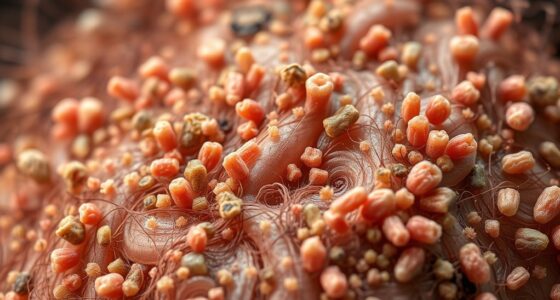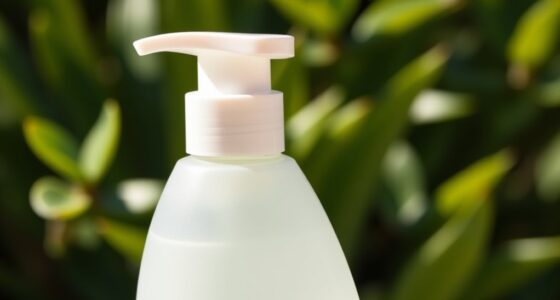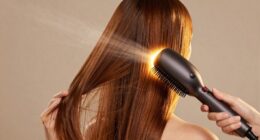If you’re experiencing thinning hair, hormones could be the cause. Imbalances in thyroid hormones, estrogen, and androgens can disrupt your hair growth cycle, leading to excessive shedding or hair loss. Stress also plays a significant role, increasing cortisol levels that negatively affect hair health. Understanding these hormonal influences is essential for addressing your thinning hair effectively. Discover more about how these factors might impact your hair and what you can do to restore its growth and health.
Key Takeaways
- Hormonal imbalances, particularly with thyroid hormones, can disrupt the hair growth cycle, leading to thinning hair or shedding.
- Elevated cortisol levels from stress can trigger telogen effluvium, resulting in significant hair loss and prolonged shedding.
- Decreased estrogen levels during menopause can shorten the anagen phase, contributing to hair thinning in women.
- High testosterone levels and its conversion to DHT can shrink hair follicles, causing androgenetic alopecia, especially in women with PCOS.
- Hormone replacement therapy and medications like spironolactone can help manage hair loss related to hormonal changes.

When you notice your hair thinning, it’s often more than just a cosmetic concern; hormones can play a notable role in this process. Your hair goes through a cycle made up of three phases: anagen, catagen, and telogen. The anagen phase is the growth phase, lasting anywhere from two to seven years. After that, hair enters the catagen phase for about two weeks before settling into the telogen phase, which can last several months.
Hair thinning often reflects hormonal influences, as hair cycles through growth, transition, and resting phases.
At any given time, around 10-15% of your hair follicles are in the resting phase, leading to natural shedding. However, hormonal imbalances can disrupt this cycle, pushing hair follicles prematurely into the resting phase, which can result in thinner hair or excessive shedding.
Thyroid hormones are essential in regulating this growth cycle. If you have an imbalance, whether hypo- or hyperthyroidism, you might experience diffuse hair loss. These conditions can shorten the duration of the anagen phase, meaning your hair isn’t growing as it should. Emotional dysregulation can also be a factor, as stress can exacerbate hormonal issues. Establishing a retirement savings plan can provide financial stability, which may help reduce stress levels related to financial concerns. Additionally, ensuring your diet includes omega-3 fatty acids from sources like chia seeds can support overall hair health.
Fortunately, restoring normal thyroid hormone levels can help revive hair growth over several months. It’s important to be aware that thyroid disorders are common culprits behind hair loss.
Cortisol, often called the stress hormone, can also impact your hair’s health. When you’re under stress, cortisol levels rise, which can lead to a condition known as telogen effluvium, characterized by considerable hair loss.
Managing stress through techniques like meditation can help mitigate these effects, and once you regain control over stress, hair growth can often resume. Chronic stress can lead to prolonged shedding and further thinning, making stress management crucial.
Estrogen plays a supportive role in hair growth by extending the anagen phase. During menopause, as estrogen levels decrease, you might notice your hair thinning. Conversely, high estrogen levels during pregnancy often result in thicker, healthier hair.
Birth control pills can also impact hormone levels, potentially leading to hair loss. Hormone replacement therapy can be a viable option for managing hair loss during menopause.
Lastly, testosterone and its conversion to DHT can notably affect hair health. DHT sensitivity can cause hair follicle shrinkage, resulting in androgenetic alopecia.
Conditions like polycystic ovary syndrome (PCOS) are linked to high testosterone levels and hair loss. Medications like spironolactone can help reduce the effects of androgens on hair. Understanding these hormonal influences can help you take steps toward addressing thinning hair effectively. Additionally, maintaining a balanced diet rich in fruits and vegetables can support overall hair health.
Frequently Asked Questions
Can Diet Influence Hormone Levels Affecting Hair Thinning?
Absolutely, your diet can greatly influence hormone levels that affect hair thinning.
When you consume healthy fats, it supports hormone synthesis. On the other hand, high sugar intake might lead to insulin resistance, increasing DHT production.
Make sure you’re getting enough protein and essential vitamins to maintain healthy hair growth.
Balancing your meals with complex carbohydrates and fiber can also help regulate hormones, promoting overall hair health.
Are There Specific Hormones Linked to Male vs. Female Hair Loss?
Yes, there are specific hormones linked to hair loss in men and women.
In men, dihydrotestosterone (DHT) plays a significant role, causing hair follicles to shrink and leading to androgenetic alopecia.
For women, hormonal imbalances, particularly involving estrogen and progesterone, contribute to hair thinning, especially during menopause.
Additionally, both genders can experience hair loss influenced by thyroid hormones and cortisol, which can affect hair growth cycles regardless of gender.
How Can Stress Impact Hair Thinning Through Hormones?
Stress can seriously impact your hair health through hormonal changes.
When you’re stressed, your body releases cortisol, which disrupts your hair growth cycle. Elevated cortisol levels lead to hormonal imbalances, inhibiting hair follicle stem cells from entering the growth phase. This can cause hair thinning and prolong the resting phase of your follicles.
Luckily, once you manage your stress, your hair may begin to recover and return to its normal growth cycle.
What Lifestyle Changes Can Help Balance Hormones for Healthier Hair?
Balancing hormones for healthier hair isn’t just about what you eat; it’s also about how you live.
While stress can wreak havoc, incorporating mindfulness practices like yoga and meditation can set a calming tone.
Pair that with a protein-rich diet and foods high in omega-3s, and you’re on the right track.
Don’t forget to stay hydrated and get enough sleep—these small shifts can lead to significant improvements in your overall health.
Are There Supplements to Support Hormonal Balance and Hair Growth?
Yes, there are supplements that can support hormonal balance and promote hair growth.
Nutrafol Women’s Balance is one option, specifically designed for women over 45. It contains ingredients like organic gelatinized maca and saw palmetto to help address hormonal changes.
In clinical studies, users reported significant improvements in hair growth and overall hair health.
Just remember to consult your doctor before starting any new supplement, especially if you have medical conditions or are on medications.
Conclusion
If you’re facing thinning hair, remember you’re not alone in this battle. Just as the seasons change, so do our bodies, often swayed by the delicate dance of hormones. Embrace this journey of self-discovery and seek solutions that feel right for you. Like a phoenix rising from the ashes, your confidence can soar again. Nurture yourself, both inside and out, and let your true beauty shine through, even when the winds of change blow your way.









